汉译英名篇林语堂英译陶渊明归去来兮辞
从审美视角品读林语堂的翻译标准_以林语堂英译_归去来兮辞_为例
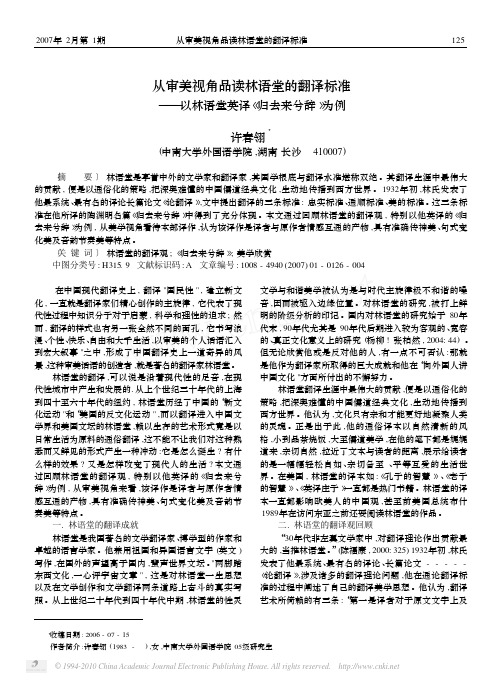
从审美视角品读林语堂的翻译标准———以林语堂英译《归去来兮辞》为例许春翎3(中南大学外国语学院,湖南长沙 410007)〔摘 要〕 林语堂是享誉中外的文学家和翻译家,其国学根底与翻译水准堪称双绝。
其翻译生涯中最伟大的贡献,便是以通俗化的策略,把深奥难懂的中国儒道经典文化,生动地传播到西方世界。
1932年初,林氏发表了他最系统、最有名的译论长篇论文《论翻译》,文中提出翻译的三条标准:忠实标准、通顺标准、美的标准。
这三条标准在他所译的陶渊明名篇《归去来兮辞》中得到了充分体现。
本文通过回顾林语堂的翻译观,特别以他英译的《归去来兮辞》为例,从美学视角看待本部译作,认为该译作是译者与原作者情感互通的产物,具有准确传神美、句式变化美及音韵节奏美等特点。
〔关键词〕 林语堂的翻译观;《归去来兮辞》;美学欣赏中图分类号:H315.9 文献标识码:A 文章编号:1008-4940(2007)01-0126-004 在中国现代翻译史上,翻译"国民性",建立新文化,一直就是翻译家们精心创作的主旋律,它代表了现代性过程中知识分子对于启蒙,科学和理性的追求;然而,翻译的样式也有另一张全然不同的面孔,它书写浪漫、个性、快乐、自由和大千生活,以审美的个人话语汇入到宏大叙事"之中,形成了中国翻译史上一道奇异的风景,这种审美话语的创造者,就是著名的翻译家林语堂。
林语堂的翻译,可以说是沿着现代性的足音,在现代性城市中产生和发展的.从上个世纪三十年代的上海到四十至六十年代的纽约,林语堂历经了中国的“新文化运动"和“美国的反文化运动",而以翻译进入中国文学界和美国文坛的林语堂,赖以生存的艺术形式竟是以日常生活为原料的通俗翻译,这不能不让我们对这种熟悉而又鲜见的形式产生一种冲动:它是怎么诞生?有什么样的效果?又是怎样改变了现代人的生活?本文通过回顾林语堂的翻译观,特别以他英译的《归去来兮辞》为例,从审美视角来看,该译作是译者与原作者情感互通的产物,具有准确传神美、句式变化美及音韵节奏美等特点。
《归去来兮辞》翻译共29页文档
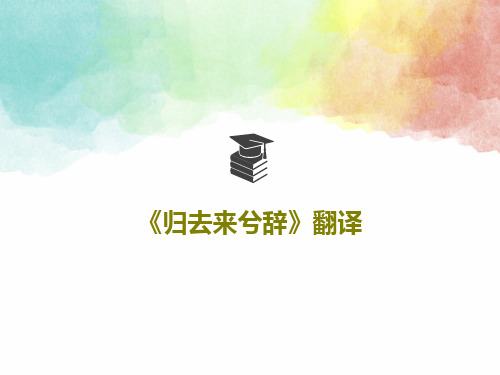
▪
26、要使整个人生都过得舒适、愉快,这是不可能的,因为人类必须具备一种能应付逆境的态度。——卢梭
▪
27、只有把抱怨环境的心情,化为上进的力量,才,好之者不如乐之者。——孔子
▪
29、勇猛、大胆和坚定的决心能够抵得上武器的精良。——达·芬奇
《归去来兮辞》翻译
26、机遇对于有准备的头脑有特别的 亲和力 。 27、自信是人格的核心。
28、目标的坚定是性格中最必要的力 量泉源 之一, 也是成 功的利 器之一 。没有 它,天 才也会 在矛盾 无定的 迷径中 ,徒劳 无功。- -查士 德斐尔 爵士。 29、困难就是机遇。--温斯顿.丘吉 尔。 30、我奋斗,所以我快乐。--格林斯 潘。
▪
30、意志是一个强壮的盲人,倚靠在明眼的跛子肩上。——叔本华
谢谢!
29
《归去来兮辞》原文及翻译

《归去来兮辞》原文及翻译陶渊明,我国著名的诗人,那么你还记的曾经学过他的《归去来兮辞》吗?下面是店铺为大家收集整理的“《归去来兮辞》原文及翻译”,供大家参考!希望可以帮助到大家!更多精彩内容请持续关注!《归去来兮辞》原文及翻译陶渊明(352或365年—427年),字元亮,又名潜,私谥“靖节”,世称靖节先生,浔阳柴桑(今江西省九江市)人。
东晋末至南朝宋初期伟大的诗人、辞赋家。
曾任江州祭酒、建威参军、镇军参军、彭泽县令等职,最末一次出仕为彭泽县令,八十多天便弃职而去,从此归隐田园。
他是中国第一位田园诗人,被称为“古今隐逸诗人之宗”,有《陶渊明集》。
原文序余家贫,耕植不足以自给。
幼稚盈室,瓶无储粟,生生所资,未见其术。
亲故多劝余为长吏,脱然有怀,求之靡途。
会有四方之事,诸侯以惠爱为德,家叔以余贫苦,遂见用于小邑。
于时风波未静,心惮远役,彭泽去家百里,公田之利,足以为酒。
故便求之。
及少日,眷然有归欤之情。
何则?质性自然,非矫厉所得。
饥冻虽切,违己交病。
尝从人事,皆口腹自役。
于是怅然慷慨,深愧平生之志。
犹望一稔,当敛裳宵逝。
寻程氏妹丧于武昌,情在骏奔,自免去职。
仲秋至冬,在官八十余日。
因事顺心,命篇曰《归去来兮》。
乙巳岁十一月也。
正文归去来兮,田园将芜胡不归?既自以心为形役,奚惆怅而独悲?悟已往之不谏,知来者之可追。
实迷途其未远,觉今是而昨非。
舟遥遥以轻飏,风飘飘而吹衣。
问征夫以前路,恨晨光之熹微。
乃瞻衡宇,载欣载奔。
僮仆欢迎,稚子候门。
三径就荒,松菊犹存。
携幼入室,有酒盈樽。
引壶觞以自酌,眄庭柯以怡颜。
倚南窗以寄傲,审容膝之易安。
园日涉以成趣,门虽设而常关。
策扶老以流憩,时矫首而遐观。
云无心以出岫,鸟倦飞而知还。
景翳翳以将入,抚孤松而盘桓。
归去来兮,请息交以绝游。
世与我而相违,复驾言兮焉求?悦亲戚之情话,乐琴书以消忧。
农人告余以春及,将有事于西畴。
或命巾车,或棹孤舟。
既窈窕以寻壑,亦崎岖而经丘。
木欣欣以向荣,泉涓涓而始流。
陶渊明《归去来兮辞》的两种译文比较

陶渊明《归去来兮辞》的两种译文比较陶渊明《归去来兮辞》的两种译文比较译文2:匿名译者Well, go back now! As the fields and gardens in home will be lying waste, why yet not go back! Since I have been familiar with that my heart has been put to be toiled by my body, why will be disconsolate and sad for myself alone? Now that I have been aware of the mistakes in past are already unable to rescue, but I have known the future life can retrieve. Really only going astray by accident but not too far, therefore, I have understood today's right and yesterday's wrong.The returning boat went forward fluttering on the river, and the gentle breeze was gently blowing and moving my upper outer garment. Asking pedestrian on the way in front, I hated the dawn light was still too faint and misted. When looking at the house after landing, I went straight forward with incomparable happy. And then I had seen the houseboys were running towards me and welcoming me with joy. After a while, I also saw the children were greeting me at the door. Entering the house, I found that the pathway has lay waste but it was deserved to be pleased for the pines andchrysanthemums still survived there. Leading the children I walked into the inner room, in which were placed the wine goblets that were full of sweetliquor. Taking up the wine pot and cup, I drank by myself. Looking at the trees in the courtyard then I really felt relaxed and happy. Leaning on the south window, I placed my feelings to look down upon the world. I began to feel that only living in the humble room, then can be easy to get a quiet mind. Every day Itake a walk in the courtyard and get pleasure from nature. Although the garden door is established, however, it is often closed. Leaning on a cane, I stroll along the pathway or take the rest leisurely everywhere. Occasionally, I raise my head to look at faraway place and then I can find that cloud and mist are blown out from the cave very naturally. I think, even the birds are aware of returning back when they have flown tired. After a while, when the sun light is dim gradually as sunset soon, but I still gently stroked the solitary pine and enjoy myself so much as to forget leaving.Well, go back home. I want to stop making friends and refuse taking part in traveling for pleasure. Since the common customs are disagreed with me, what can spur me to drive vehicle and go out on tour? A lot of understanding words talking between relatives make me with pleasure; playing a musical instrument and reading books can divert me from boredom and remove my grief. Before long, the farmers told me the spring has come and I should go to west for cultivating farmland. Then, some people push their wheelbarrows and others paddle their little boats. Sometimes I go into the mountain valley along a meandered stream and sometimes follow a rugged path to go by a massif. The trees are growing up luxuriantly and the spring water begins to pour trickling sluggishly. I admire all things on earth can meet theopportunities given by heaven but I sign of emotion that my whole life will be over quickly.Let it go at that! I don't know how much time I can live in the world! Why can't I let down my heart to let my life and death naturally? Is it necessary for me to go wherever searching something in a hurry? Seeking for riches and honor is not mywish and looking further for paradise is unable to anticipate. I am always longing for a nice weather that can let me stick my cane in the earth by the field and going for weeding and planting seedling. Or ascend the high hill at east to shout at the top of my lungs with sound reproduction, or face to the clear flowing water to recite poems. Merely, let me move towards the end of life along with the change of the nature. I believe that every happening in one's life is determined by fate and is inevitable; therefore one should be always content with circumstances and have no worries. I consider this conviction may be without doubt!(一) 译文篇章结构对比and waiting at the door are the greeting children.译文2: And then I had seen the houseboys were running towardsme and welcoming me with joy. After a while, I also saw the children were greeting me at the door.在例句(1)中,译文1用连词and将两个简单句连接起来构成并列句,译文2用连接词and将两个动词短语并列从而构成一个复杂句。
《归去来兮辞》原文,注释,翻译(Chosuntext,notes,translation)
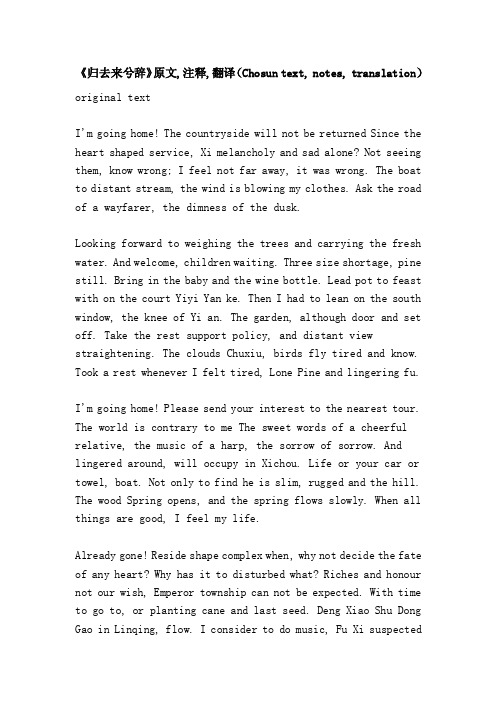
《归去来兮辞》原文,注释,翻译(Chosun text, notes, translation)original textI'm going home! The countryside will not be returned Since the heart shaped service, Xi melancholy and sad alone? Not seeing them, know wrong; I feel not far away, it was wrong. The boat to distant stream, the wind is blowing my clothes. Ask the road of a wayfarer, the dimness of the dusk.Looking forward to weighing the trees and carrying the fresh water. And welcome, children waiting. Three size shortage, pine still. Bring in the baby and the wine bottle. Lead pot to feast with on the court Yiyi Yan ke. Then I had to lean on the south window, the knee of Yi an. The garden, although door and set off. Take the rest support policy, and distant view straightening. The clouds Chuxiu, birds fly tired and know. Took a rest whenever I felt tired, Lone Pine and lingering fu.I'm going home! Please send your interest to the nearest tour. The world is contrary to me The sweet words of a cheerful relative, the music of a harp, the sorrow of sorrow. And lingered around, will occupy in Xichou. Life or your car or towel, boat. Not only to find he is slim, rugged and the hill. The wood Spring opens, and the spring flows slowly. When all things are good, I feel my life.Already gone! Reside shape complex when, why not decide the fate of any heart? Why has it to disturbed what? Riches and honour not our wish, Emperor township can not be expected. With time to go to, or planting cane and last seed. Deng Xiao Shu Dong Gao in Linqing, flow. I consider to do music, Fu Xi suspecteddestiny!Text annotation(1) 14: means "go back". The auxiliary word is meaningless. Xi, modal particles.(2) the pastoral land will not return to the fields: the fields will be barren, why not go back? What is the same as Hu?".(3) to heart shaped service: let the mind to form the servitude. It is not an official one, but in order to avoid hunger and cold, violates the original intention to become an officer. Heart, will. Shape, shape, or body. Servitude.(4) Xi melancholy and sad: why only sorrow frustrated. Melancholy, frustrated appearance.(5) seeing is not aware of the past: to the wrong (Shi pointed out) is not correct. Remonstrance, admonish, discourage.(6) know wrong: know the future of things (direction implicit) can also save. Chase, save, remedy.(7) reality: indeed. Lost: official. Its: probably.(8) yes. Non: error.(9) the boat to distant stream [y ng]: the boat on the water gently floating forward. A distant, wavering look. By and by. Yang, flying boat, described the brisk appearance.(10) levy a husband: a pedestrian, not a soldier. To take (to ask: anterior Yukio) after the "and lingered around is like this. Front: front.(11) the dimness was gently: Unfortunately, the day just bright. Hate: regret. The dawn, twilight, day not bright.(12) looking forward to weighing the house, carrying the Xin to run: see the house of oneself house, in the heart joy, run past. Look afar. A simple house.(13): young children.(14) three size shortage, pine road is still in the yard: desolate, pine long in there. Three paths, hospital lane. After the Han Jiang Xu [x sea] seclusion, in the courtyard of Bamboo under the opening of the three size, only a small number of friends to travel.Later generations figure, and "three paths", refers to the hermit lived. Close to.(15) surplus Zun: cupfuls.(16) lead: bring it. A ng] glass [sh. At the [mi n] court have Yiyi Ke Yan: look at the trees in the yard, feel very happy. Ogle, angle. Here's the meaning of "just look around.". Ke, bough. For: in order to. Yi Yan, make facial expression show happy look.(17): then I had pinned proud mood. Proud, proud to.(18) let the knee feel uneasy: it is very comfortable to live in a simple hut. Trial, awareness. Hold the knee, can only accommodate two knees of the house, extremely small.(19) the garden every day to walk in the park, a kind of fun. Involve, get involved, walk to.(20) scheme support take the rest. [q]: on crutches to go out for a walk, rest whenever and wherever possible. Policy, leaning on. Help old man, stick. Rest, rest. Flow recreation, tourism, there is no fixed place, walk around and rest.(21) and distant view straightening: always looked up to the distance at. Lifting. Far, far away.(22) clouds to Chuxiu [xi]: cloud connected naturally emerge from the mountains. Unintentionally. Currently, the mountain cave, here refers to the mountain.(23) king [y] to the nebula Nebula: Sun dim, the sun soon fell. Scene, daylight. Still, dark.(24): to help Lone Pine and pine walking around. Linger: hover, wandering, lingering.(25) please send your interest to the tour: stop paying interest, stop communicating with people and cut off your friends. Means no longer has anything to do with officialdom.(26) the world is contrary to me, and the answer is: "the world is contrary to what I think, what can I try to find?" Driving, driving here, driving a car to get what you want. Word, auxiliary word.(27) intimate words: intimate words.(28) spring and: spring is here.(29) something will happen in Xichou: the fields in the West will begin to cultivate. Have something to do with farming. It means farming here. Domain.(30) or life towel: sometimes called a car with the car. Towel car, car car.(31) [zh, o] or your boat: sometimes a boat. Zhao, the original meaning of the oar. Here nouns are verbs, which means rowing.(32) both slim: After twists and turns to seek gully valley. Yaotiao, twists and turns. Gully ravine.(33) rugged and passing hills: the rugged mountain path.(34): the lush trees are thriving xiangrong. Xinxin, Xiang Rong, are the vegetation grow lush.(35) Juan Juan: the subtle flow of water.(36) when all things are good, I feel that I am born. Hugh: I envy everything in nature. Once in spring, I grow up in time,and I sigh that my life is ending. Good, joyful, envious. OK, Sue is about to end.(37) let go of it: "forget it!" the auxiliary word "Yi" is used in conjunction with "almost" to strengthen the exclamatory mood.(38) reside shape complex when, and [h] not Wei life as it comes alive: how long can, why not obey their wishes, it what life and death? Parasitism. In the world, between heaven and earth. Why,What。
林语堂《归去来兮辞》译文赏析

林语堂《归去来兮辞》译文赏析林语堂的散文很有特色,写景写情,以情见长。
他的诗歌文字功力很深,而且清新流畅。
《归去来兮辞》是一篇抒情的散文。
它是《世说新语》中《咏雪》篇的姊妹篇。
因此,后人常把这两篇合为一卷。
他在一九四三年初春回故乡,与族弟聚会,饮酒作诗,玩赏山水。
后来回到上海,完成了这篇散文。
一个下午,太阳偏西,突然乌云像波浪一样涌来,使人感到秋天即将来临了。
随着日暮西垂,黄昏就要降临,不免心情忧郁。
这是触景生情,以乐景写哀情。
本篇开头两句“羁鸟恋旧林,池鱼思故渊”,看似脱口而出,其实是融化古人和当代的许多诗意之后才写成的。
这首《归去来兮辞》是林语堂二十八岁时所作。
那年冬天,他从美国回来探亲,亲朋好友欢聚畅谈,都期待着他再次出国学习深造,继续追求学问。
但是,回家以后,亲眼看到村里的乡亲们辛勤劳作,生活却仍处于贫困潦倒的境地,生活的压力,使他感到难过。
正因为生活的重负与理想之间的巨大落差,才导致了他这次感情爆发,创作了这篇经典的《归去来兮辞》。
这篇文章,既没有铺陈描写的景物,也没有绚丽华美的词藻,就像一首普通的田园小诗,平淡无奇。
在短短的不足千字的篇幅中,却蕴含着无限的内涵。
它对人生做了哲学式的追问:人应该怎么活?如何实现自己的价值?用苏东坡的话说,是“无事此静坐,一日似两日”;用庄子的话说,是“与造物者游”。
他虽是在陈述一种心境,但是也向我们传达出这样一个信息——庄子思想的痕迹,在《归去来兮辞》中有着明显的体现。
如果你能真正领会这篇散文,体会出文章中的平淡无奇背后所蕴含的丰富意义,那么你也会获得一种人生智慧。
古往今来,有多少人像陶渊明一样,追求一份简单质朴的生活,又有多少人追求功名利禄,纵情声色?因此,虽然社会繁华,在尘世中的人们依然处于一种迷茫的状态,不知道该怎样实现自己的人生价值。
林语堂的散文《归去来兮辞》表面上看起来只是在陈述一种心境,但是,如果仔细品味,就会发现其实它是对人生的一种追问,它让我们沉淀心灵,让我们明白,人应该怎么活,应该活出怎样的人生,才算不枉来这世界走一遭!在《归去来兮辞》中,蕴含着关于生命、关于生活的智慧,就像一杯茶,虽然平淡无奇,但是回味无穷,令人回味。
英译陶渊明《归去来兮辞》

陶渊明《归去来兮辞》归去来兮,田园将芜胡不归!既自以心为形役,奚惆怅而独悲?悟已往之不谏,知来者之可追。
实迷途其未远,觉今是而昨非。
舟遥遥以轻飏,风飘飘而吹衣。
问征夫以前路,恨晨光之熹微。
乃瞻衡宇,载欣载奔。
僮仆欢迎,稚子候门。
三径就荒,松菊犹存。
携幼入室,有酒盈樽。
引壶觞以自酌,眄庭柯以怡颜。
倚南窗以寄傲,审容膝之易安。
园日涉以成趣,门虽设而常关。
策扶老以流憩,时矫首而遐观。
云无心以出岫,鸟倦飞而知还。
景翳翳以将入,抚孤松而盘桓。
归去来兮,请息交以绝遊。
世与我而相违,复驾言兮焉求?悦亲戚之情话,乐琴书以消忧。
农人告余以春及,将有事于西畴。
或命巾车,或棹孤舟。
既窈窕以寻壑,亦崎岖而经邱。
木欣欣以向荣,泉涓涓而始流。
善万物之得时,感吾生之行休。
遑遑欲何之?富贵非吾愿,帝乡不可期。
怀良辰以孤往,或植杖而耘耔。
登东皋以舒啸,临清流而赋诗。
聊乘化以归尽,乐夫天命复奚疑!Ah, homeward bound I go!Why not go home, seeing that my fieldand gardens are overgrown?Myself have made my soul serf to my body:why have vain regrets and mourn alone?Fret not over bygonesand the forward journey take.Only a short distance have I gone astray,and I know today I am right,if yesterday was a complete mistake.Lightly floats and drifts the boat,and gently flows and flaps my gown.I inquire the road of a wayfarer,and sulk at the dimness of the dawn.Then when I catch sight of my old roofs,joy will my steps quicken.Servants will be there to bid me welcome,and waiting at the door are the greeting children.Gone to seed, perhaps, are my garden paths,but there will still bethe chrysanthemums and the pine!I shall lead the youngest boy in by the hand,and on the table there stands a cup full of wine!Holding the pot and cup, I give myself a drink,happy to see in the courtyard the hanging bough.I lean upon the southern window with an immense satisfaction, and note that the little place is cosy enough to walk around.The garden grows more familiarand interesting with the daily walks.What if no one knocks at the always closed door!Carrying a cane I wander at peace,and now and then look aloft to gaze at the blue above.There the clouds idle away from their mountain recesses without any intent or purpose,and birds, when tired of their wandering flights,will think of home.Darkly then fall the shadows and, ready to come home,I yet fondle the lonely pines and loiter around.Ah, homeward bound I go!Let me from now on learn to live alone!The world and I are not made for one another,and why go round like one looking for what he has not found?Content shall I be with conversations with my own kin,and there will be music and booksto while away the hours.The farmers will come and tell me that spring is hereand there will be work to do at the western farm.Some order covered wagons;some row in small boats.Sometimes we explore quiet, unknown ponds,and sometimes we climb over steep, rugged mounds.There the trees, happy of heart, grow marvelously green, and spring water gushes forth with a gurgling sound.I admire how things grow and prosperaccording to their seasons,and feel that thus, too, shall my life go its round.Enough!How long yet shall I this mortal shape keep?Why not take life as it comes,and why hustle and bustle like one on an errand bound?Wealth and power are not my ambitions,and unattainable is the abode of the gods!I would go forth alone on a bright morning,or perhaps, planting my cane,begin to pluck the weeds and till the ground.Or I would compose a poem beside a clear stream,or perhaps go up to Tungkaoand make a long-drawn call on top of the hill.So would I be content to live and die,and without questionings of the heart,gladly accept Heaven's will.-- excerpted from The Importance of Living, by Lin Yutang。
归去来兮辞(原文对照翻译)
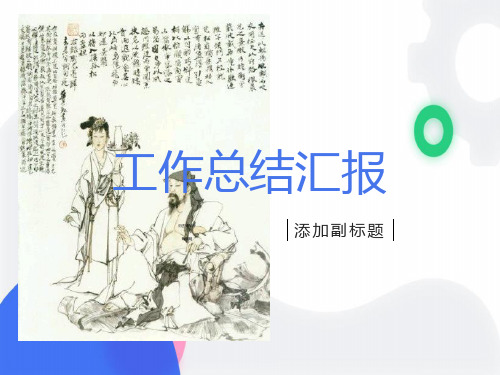
我拿过酒壶酒杯自斟自饮,看看庭院中的树木使我很开颜。倚着南窗寄托我傲然自得的情怀,知道这狭小之地反而容易使我心安。小园有门却经常关闭着,每天(独自)在园中散步兴味无穷;拄着拐杖,走走歇歇,时时抬头向着远方眺望。云气悠闲自在地从山穴里飘浮而出,倦飞的小鸟也知道飞回巢中;阳光暗淡,太阳即将落山,我手扶着孤松,徘徊流连,不忍离去。
赞曰:“黔娄之妻有言:‘不戚戚于贫贱,不汲汲于富贵。’其言兹若人之俦乎?衔觞赋诗,以乐其志.无怀氏之民欤?葛天氏之民欤?”
《五柳先生传》节选
译文: 这位先生不知道是什么地方人,也弄不清他的姓名。他的住宅旁边植有五棵柳树,因此就用“五柳”作为他的别号了。五柳先生安闲沉静,不好言谈,也不羡慕荣华利禄。喜欢读书,但不执着于对一字一句的琐细解释;每当读书有所领悟的时候,就会高兴得忘了吃饭。生性嗜好喝酒,但因为家贫就不能经常得到。亲朋好友知道他这种境况,有时备酒招待他。他前去饮酒时总是开怀畅饮,直到大醉方休;醉后就向主人告辞,从不以去留为意。他的住室四壁空空荡荡,破旧得连风和太阳都无法遮挡,穿的粗布短衣打满了补钉,饮食简陋而且经常短缺,而他却能安然自得。常常以写诗作文章当娱乐,抒发自己的志趣。他能够忘掉世俗的得失,只愿这样度过自己的一生。
听朗诵,感受音韵美
是战国后期诗人屈原在楚地民歌的基础上创造出来的一种新诗体,也称楚辞。
辞
①句式散化,一般押韵。
②两句一组,四句一节。
③六字句为主,一般每句三拍。
文体简介
文体简介
到了西汉,在辞的影响下又产生了赋这种新文体。汉人将辞和赋统称为辞赋,但二者仍有显著的区别:赋的句式进一步散文化,常用关联词语,长短句明显增多,内容则以咏物说理为主,写法上讲究铺排;而辞仍然是诗,重在抒情,形式上尽管后来也有若干变化,但四句一节、每句三拍的格局还是保持了下来。
《归去来兮辞》原文与译文
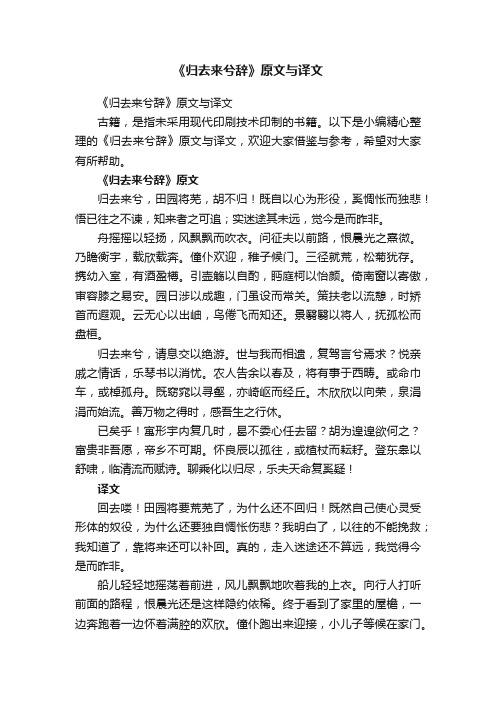
《归去来兮辞》原文与译文《归去来兮辞》原文与译文古籍,是指未采用现代印刷技术印制的书籍。
以下是小编精心整理的《归去来兮辞》原文与译文,欢迎大家借鉴与参考,希望对大家有所帮助。
《归去来兮辞》原文归去来兮,田园将芜,胡不归!既自以心为形役,奚惆怅而独悲!悟已往之不谏,知来者之可追;实迷途其未远,觉今是而昨非。
舟摇摇以轻扬,风飘飘而吹衣。
问征夫以前路,恨晨光之熹微。
乃瞻衡宇,载欣载奔。
僮仆欢迎,稚子候门。
三径就荒,松菊犹存。
携幼入室,有酒盈樽。
引壶觞以自酌,眄庭柯以怡颜。
倚南窗以寄傲,审容膝之易安。
园日涉以成趣,门虽设而常关。
策扶老以流憩,时矫首而遐观。
云无心以出岫,鸟倦飞而知还。
景翳翳以将人,抚孤松而盘桓。
归去来兮,请息交以绝游。
世与我而相遗,复驾言兮焉求?悦亲戚之情话,乐琴书以消忧。
农人告余以春及,将有事于西畴。
或命巾车,或棹孤舟。
既窈窕以寻壑,亦崎岖而经丘。
木欣欣以向荣,泉涓涓而始流。
善万物之得时,感吾生之行休。
已矣乎!寓形宇内复几时,曷不委心任去留?胡为遑遑欲何之?富贵非吾愿,帝乡不可期。
怀良辰以孤往,或植杖而耘耔。
登东皋以舒啸,临清流而赋诗。
聊乘化以归尽,乐夫天命复奚疑!译文回去喽!田园将要荒芜了,为什么还不回归!既然自己使心灵受形体的奴役,为什么还要独自惆怅伤悲?我明白了,以往的不能挽救;我知道了,靠将来还可以补回。
真的,走入迷途还不算远,我觉得今是而昨非。
船儿轻轻地摇荡着前进,风儿飘飘地吹着我的上衣。
向行人打听前面的路程,恨晨光还是这样隐约依稀。
终于看到了家里的屋檐,一边奔跑着一边怀着满腔的欢欣。
僮仆跑出来迎接,小儿子等候在家门。
园子里象征隐土生活的“三径”已经荒废,可是我心爱的松菊却还幸存。
拉着幼子的手走进屋门,已准备了美酒盛满酒樽。
高高地举起酒壶和酒觞自酌自饮,悠闲地看着庭园的树枝露出了笑颜。
依靠着南窗(窗外有傲天的孤松)寄托自己傲世的情怀,确实感到这小小的空间就可以使人心安。
每天在庭园散步已经养成乐趣,虽然安了家门却常常把它闭关。
《归去来兮辞》三个英译本的求真务实度对比

《归去来兮辞》三个英译本的求真务实度对比作者:侯莹莹来源:《文学教育》 2020年第5期侯莹莹内容摘要:不同译者因自身文化背景和翻译理念的差异,其译文效果各异。
从译者行为批评理论的求真务实连续统模式出发,对比分析《归去来兮辞》三个英译本,探究译文诗体和诗情不同程度的求真性与务实性,并简析译者行为差异原因。
关键词:《归去来兮辞》英译译者行为批评理论求真务实一.引言陶渊明享有“古今隐逸诗人之宗”的美誉,他融合儒、释、道之精华,首创田园诗歌。
其诗文优美刚劲、似澹而实美,为古今中外学者津津乐道。
就翻译成果而言,国内外共存8种陶诗全译本,研究内容有译文对比、研究综述、译者翻译思想等,展现了陶诗外译与中国诗歌文化传播的内在联系。
陶渊明诗集包括诗歌125首,辞赋、韵文及散文12篇,但学者们大多集中于《桃花源记》《饮酒》《归园田居》的译文分析上,对其他诗文关注尚存不足。
《归去来兮辞》作为陶渊明高洁品性和人生隐逸选择的符号代表,其英译研究有助于英语读者加深对诗人形象的认知,品味深厚的中华文化。
而仅有的三篇论文只是在探究林语堂翻译观中简略分析了《归去来兮辞》的英译[1],或简要分析译者翻译心理。
译者是文化的传播者,不同译者对文化传播效果发挥不同作用。
本文基于译者行为批评理论,分析杨宪益、戴乃迭[2](118-127)、汪榕培[3](242-247)、林语堂[4](2-9)(下文分别简称杨译、汪译、林译)的译文效果,既详细对比了译文语言翻译策略,又挖掘出译者行为的社会性,丰富了诗歌英译研究的意义。
二.译者行为与“求真—务实”连续统评价模式“译者行为”中的“译者”,默认的是意志体的译者“人”;“行为”指的是连续的、有规律可循的行动[5](9)。
译者行为批评以评价为目的,以译文质量评价为出口,以社会为评价视域,在翻译社会学的框架内,构建译者批评理论体系[6](3)。
“求真一务实”连续统评价模式旨在对译者行为和翻译社会化做出客观的描写,解读译者行为背后的社会性原因。
归去来兮辞 文白上下对译
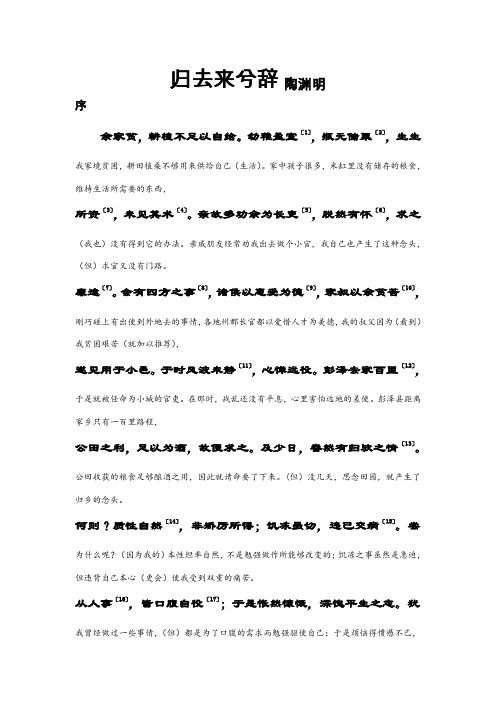
归去来兮辞陶渊明序余家贫,耕植不足以自给。
幼稚盈室〔1〕,瓶无储粟〔2〕,生生我家境贫困,耕田植桑不够用来供给自己(生活)。
家中孩子很多,米缸里没有储存的粮食,维持生活所需要的东西,所资〔3〕,未见其术〔4〕。
亲故多劝余为长吏〔5〕,脱然有怀〔6〕,求之(我也)没有得到它的办法。
亲戚朋友经常劝我出去做个小官,我自己也产生了这种念头,(但)求官又没有门路。
靡途〔7〕。
会有四方之事〔8〕,诸侯以惠爱为德〔9〕,家叔以余贫苦〔10〕,刚巧碰上有出使到外地去的事情,各地州郡长官都以爱惜人才为美德,我的叔父因为(看到)我贫困艰苦(就加以推荐),遂见用于小邑。
于时风波未静〔11〕,心惮远役。
彭泽去家百里〔12〕,于是就被任命为小城的官吏。
在那时,战乱还没有平息,心里害怕远地的差使。
彭泽县距离家乡只有一百里路程,公田之利,足以为酒,故便求之。
及少日,眷然有归欤之情〔13〕。
公田收获的粮食足够酿酒之用,因此就请命要了下来。
(但)没几天,思念田园,就产生了归乡的念头。
何则?质性自然〔14〕,非矫厉所得;饥冻虽切,违己交病〔15〕。
尝为什么呢?(因为我的)本性坦率自然,不是勉强做作所能够改变的;饥冻之事虽然是急迫,但违背自己本心(更会)使我受到双重的痛苦。
从人事〔16〕,皆口腹自役〔17〕;于是怅然慷慨,深愧平生之志。
犹我曾经做过一些事情,(但)都是为了口腹的需求而勉强驱使自己;于是烦恼得愤懑不已,感到自己非常有愧于平生的志愿。
望一稔〔18〕,当敛裳宵逝〔19〕。
寻程氏妹丧于武昌〔20〕,情在骏奔〔21〕,但还是想等到秋收以后,就收拾行装连夜离去。
不久,嫁到程家的妹妹在武昌去世,我心情悲痛,希望立刻就去奔丧,自免去职。
仲秋至冬〔22〕,在官八十余日。
因事顺心,命篇曰《归于是就自己弃官离职了。
从秋八月到冬季,在官位上做了八十多天。
趁着这件事情来抒发自己心里的情意,写了篇文章命名为《归去来兮》。
时在乙巳年十一月。
去来兮》。
陶渊明《归去来兮辞》原文及翻译
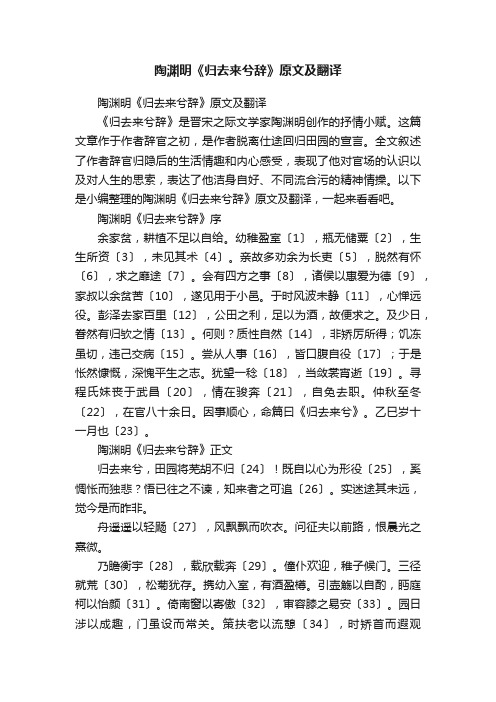
陶渊明《归去来兮辞》原文及翻译陶渊明《归去来兮辞》原文及翻译《归去来兮辞》是晋宋之际文学家陶渊明创作的抒情小赋。
这篇文章作于作者辞官之初,是作者脱离仕途回归田园的宣言。
全文叙述了作者辞官归隐后的生活情趣和内心感受,表现了他对官场的认识以及对人生的思索,表达了他洁身自好、不同流合污的精神情操。
以下是小编整理的陶渊明《归去来兮辞》原文及翻译,一起来看看吧。
陶渊明《归去来兮辞》序余家贫,耕植不足以自给。
幼稚盈室〔1〕,瓶无储粟〔2〕,生生所资〔3〕,未见其术〔4〕。
亲故多劝余为长吏〔5〕,脱然有怀〔6〕,求之靡途〔7〕。
会有四方之事〔8〕,诸侯以惠爱为德〔9〕,家叔以余贫苦〔10〕,遂见用于小邑。
于时风波未静〔11〕,心惮远役。
彭泽去家百里〔12〕,公田之利,足以为酒,故便求之。
及少日,眷然有归欤之情〔13〕。
何则?质性自然〔14〕,非矫厉所得;饥冻虽切,违己交病〔15〕。
尝从人事〔16〕,皆口腹自役〔17〕;于是怅然慷慨,深愧平生之志。
犹望一稔〔18〕,当敛裳宵逝〔19〕。
寻程氏妹丧于武昌〔20〕,情在骏奔〔21〕,自免去职。
仲秋至冬〔22〕,在官八十余日。
因事顺心,命篇曰《归去来兮》。
乙巳岁十一月也〔23〕。
陶渊明《归去来兮辞》正文归去来兮,田园将芜胡不归〔24〕!既自以心为形役〔25〕,奚惆怅而独悲?悟已往之不谏,知来者之可追〔26〕。
实迷途其未远,觉今是而昨非。
舟遥遥以轻飏〔27〕,风飘飘而吹衣。
问征夫以前路,恨晨光之熹微。
乃瞻衡宇〔28〕,载欣载奔〔29〕。
僮仆欢迎,稚子候门。
三径就荒〔30〕,松菊犹存。
携幼入室,有酒盈樽。
引壶觞以自酌,眄庭柯以怡颜〔31〕。
倚南窗以寄傲〔32〕,审容膝之易安〔33〕。
园日涉以成趣,门虽设而常关。
策扶老以流憩〔34〕,时矫首而遐观〔35〕。
云无心以出岫〔36〕,鸟倦飞而知还。
景翳翳以将入〔37〕,抚孤松而盘桓。
归去来兮,请息交以绝游。
世与我而相违,复驾言兮焉求〔38〕?悦亲戚之情话,乐琴书以消忧。
陶渊明桃花源记英译赏析「双语」
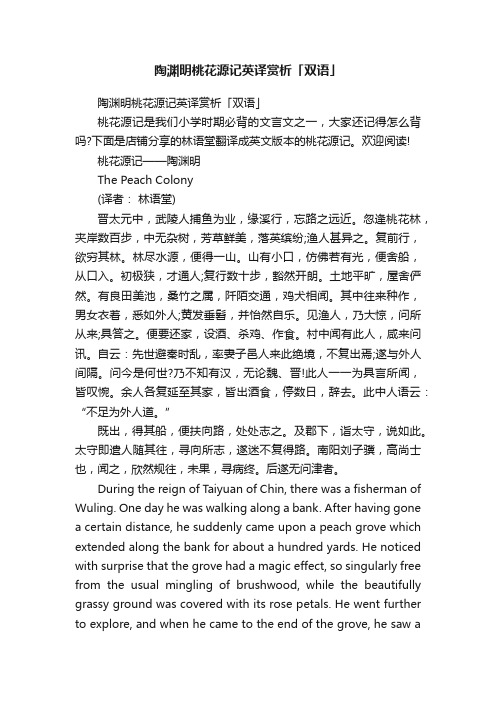
陶渊明桃花源记英译赏析「双语」陶渊明桃花源记英译赏析「双语」桃花源记是我们小学时期必背的文言文之一,大家还记得怎么背吗?下面是店铺分享的林语堂翻译成英文版本的桃花源记。
欢迎阅读!桃花源记——陶渊明The Peach Colony(译者:林语堂)晋太元中,武陵人捕鱼为业,缘溪行,忘路之远近。
忽逢桃花林,夹岸数百步,中无杂树,芳草鲜美,落英缤纷;渔人甚异之。
复前行,欲穷其林。
林尽水源,便得一山。
山有小口,仿佛若有光,便舍船,从口入。
初极狭,才通人;复行数十步,豁然开朗。
土地平旷,屋舍俨然。
有良田美池,桑竹之属,阡陌交通,鸡犬相闻。
其中往来种作,男女衣着,悉如外人;黄发垂髫,并怡然自乐。
见渔人,乃大惊,问所从来;具答之。
便要还家,设酒、杀鸡、作食。
村中闻有此人,咸来问讯。
自云:先世避秦时乱,率妻子邑人来此绝境,不复出焉;遂与外人间隔。
问今是何世?乃不知有汉,无论魏、晋!此人一一为具言所闻,皆叹惋。
余人各复延至其家,皆出酒食,停数日,辞去。
此中人语云:“不足为外人道。
”既出,得其船,便扶向路,处处志之。
及郡下,诣太守,说如此。
太守即遣人随其往,寻向所志,遂迷不复得路。
南阳刘子骥,高尚士也,闻之,欣然规往,未果,寻病终。
后遂无问津者。
During the reign of Taiyuan of Chin, there was a fisherman of Wuling. One day he was walking along a bank. After having gone a certain distance, he suddenly came upon a peach grove which extended along the bank for about a hundred yards. He noticed with surprise that the grove had a magic effect, so singularly free from the usual mingling of brushwood, while the beautifully grassy ground was covered with its rose petals. He went further to explore, and when he came to the end of the grove, he saw aspring which came from a cave in the hill, Having noticed that there seemed to be a weak light in the cave, he tied up his boat and decided to go in and explore. At first the opening was very narrow, barely wide enough for one person to go in. After a dozen steps, it opened into a flood of light. He saw before his eyes a wide, level valley, with houses and fields and farms. There were bamboos and mulberries; farmers were working and dogs and chickens were running about. The dresses of the men and women were like those of the outside world, and the old men and children appeared very happy and contented. They were greatly astonished to see the fisherman and asked him where he had come from. The fisherman told them and was invited to their homes, where wine was served and chicken was killed for dinner to entertain him. The villagers hearing of his coming all came to see him and to talk. They said that their ancestors had come here as refugees to escape from the tyranny of Tsin Shih-huang (builder of Great Wall) some six hundred years ago, and they had never left it. They were thus completely cut off from the world, and asked what was the ruling dynasty now. They had not even heard of the Han Dynasty (two centuries before to two centuries after Christ), not to speak of the Wei (third century A.D.) and the Chin (third and fourth centuries). The fisherman told them, which they heard with great amazement. Many of the other villagers then began to invite him to their homes by turn and feed him dinner and wine.After a few days, he took leave of them and left. The villagers begged him not to tell the people outside about their colony.The man found his boat and came back, marking with signs the route he had followed. He went to the magistrate’s office and told the magistrate about it. The latter sent someone to gowith him and find the place. They looked for the signs but got lost and could never find it again. Liu Tsechi of Nanyang was a great idealist. He heard of this story, and planned to go and find it, but was taken ill and died before he could fulfill his wish. Since then, no one has gone in search of this place.【陶渊明桃花源记英译赏析「双语」】。
归去来兮辞英文版

"归去来兮辞"的英文版是"Return Home Song",直译为"归去来兮歌"。
这是一首由中国诗人陶渊明创作的诗歌,表达了他对田园生活的向往和对官场生活的厌倦。
以下是"归去来兮辞"的英文版:Return Home SongBy Tao YuanmingI go and come as I please, now it's time to return.With my heart I leave this world, and my feet are firmly planted on the ground.The fields are lush and green, the cottages are quiet and still.The smoke rises from the chimneys, and the water flows from the mill.I've tired of the world of men, their jealousies and lies.I've tired of the court and its ways, the endless games and prizes.I'll go back to the fields and woods, to the simple life of the plough.To live my days in peace, and be at one with nature now.The wind is strong, the waves are high, I'm going home to rest.To lay down my burden, and forget the world of wealth and power.To be at peace with myself, and at one with nature now.For this is my heart's desire, to be at home in the world.。
桃花源记英译分析

作多样性的活动,把中国人的情感、思想以及生 活辗转传给西方读者,使他们能够了解和欣赏。
• 林语堂翻译独特的地方,就是能够彻底消 化了心爱的文章,然后夹叙夹议,用自己 的创意炮制一番,既能抓住原文的形式和 精神,又容易让一般的西洋读者了解。
• 林语堂的翻译特点是通畅易懂,少用“行 语〞,中等文化的读者都能看懂
作品类型
• 饮酒诗 • 咏怀诗 • 田园诗
• 代表作品:?五柳先生传?、?桃花源记??归 去来兮辞??归园田居?
译者简介
林语堂
• 林语堂〔1895年10月10日-1976年3月26日〕,福建龙溪〔今 漳州〕人,原名和乐,后改玉堂,又改语堂 ,中国现代著名 作家、学者、翻译家、语言学家,新道家代表人物。
译文分析
桃花源记
• 林语堂“The Peach Colony〞 • 罗经国“A Tale of the Fountain of
the Peach Blossom Spring〞 • 谢百魁“The Peach Blossom Source
〞
晋太元中
• 林语堂 • During the reign of Taiyuan of Chin • 罗经国 • In the year of Taiyuan (2) of the Jin Dynasty • 谢百魁 • One day in the Taiyuan period ofhtower
• James Robert Hightower (7 May 1915 – 8 January 2006) was an American Sinologist and professor of Chinese at Harvard University who specialized in the translation of Chinese literature. Although he spent his youth in Colorado, Hightower lived most of his life in Cambridge, Massachusetts studying and teaching at Harvard.
以《浮生六记》英译为例浅析林语堂的翻译观
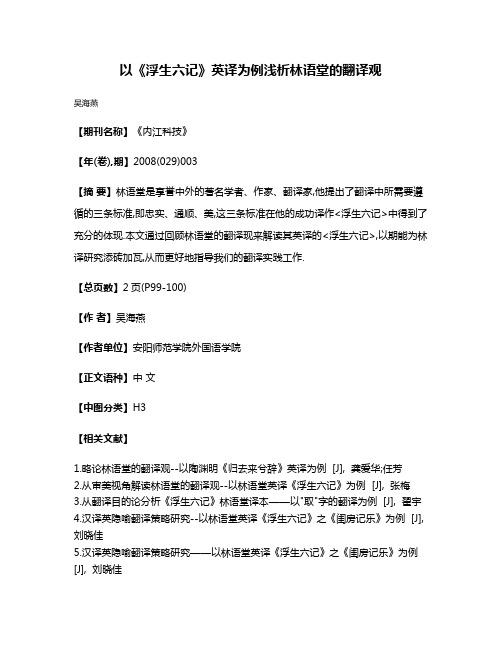
以《浮生六记》英译为例浅析林语堂的翻译观
吴海燕
【期刊名称】《内江科技》
【年(卷),期】2008(029)003
【摘要】林语堂是享誉中外的著名学者、作家、翻译家,他提出了翻译中所需要遵循的三条标准,即忠实、通顺、美,这三条标准在他的成功译作<浮生六记>中得到了充分的体现.本文通过回顾林语堂的翻译现来解读其英译的<浮生六记>,以期能为林译研究添砖加瓦,从而更好地指导我们的翻译实践工作.
【总页数】2页(P99-100)
【作者】吴海燕
【作者单位】安阳师范学院外国语学院
【正文语种】中文
【中图分类】H3
【相关文献】
1.略论林语堂的翻译观--以陶渊明《归去来兮辞》英译为例 [J], 龚爱华;任芳
2.从审美视角解读林语堂的翻译观--以林语堂英译《浮生六记》为例 [J], 张梅
3.从翻译目的论分析《浮生六记》林语堂译本——以"取"字的翻译为例 [J], 翟宇
4.汉译英隐喻翻译策略研究--以林语堂英译《浮生六记》之《闺房记乐》为例 [J], 刘晓佳
5.汉译英隐喻翻译策略研究——以林语堂英译《浮生六记》之《闺房记乐》为例[J], 刘晓佳
因版权原因,仅展示原文概要,查看原文内容请购买。
归去来兮辞英译本
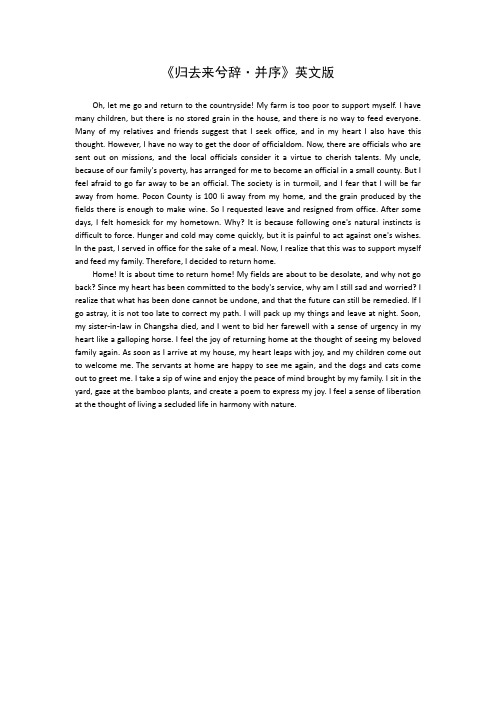
《归去来兮辞·并序》英文版Oh, let me go and return to the countryside! My farm is too poor to support myself. I have many children, but there is no stored grain in the house, and there is no way to feed everyone. Many of my relatives and friends suggest that I seek office, and in my heart I also have this thought. However, I have no way to get the door of officialdom. Now, there are officials who are sent out on missions, and the local officials consider it a virtue to cherish talents. My uncle, because of our family's poverty, has arranged for me to become an official in a small county. But I feel afraid to go far away to be an official. The society is in turmoil, and I fear that I will be far away from home. Pocon County is 100 li away from my home, and the grain produced by the fields there is enough to make wine. So I requested leave and resigned from office. After some days, I felt homesick for my hometown. Why? It is because following one's natural instincts is difficult to force. Hunger and cold may come quickly, but it is painful to act against one's wishes. In the past, I served in office for the sake of a meal. Now, I realize that this was to support myself and feed my family. Therefore, I decided to return home.Home! It is about time to return home! My fields are about to be desolate, and why not go back? Since my heart has been committed to the body's service, why am I still sad and worried? I realize that what has been done cannot be undone, and that the future can still be remedied. If I go astray, it is not too late to correct my path. I will pack up my things and leave at night. Soon, my sister-in-law in Changsha died, and I went to bid her farewell with a sense of urgency in my heart like a galloping horse. I feel the joy of returning home at the thought of seeing my beloved family again. As soon as I arrive at my house, my heart leaps with joy, and my children come out to welcome me. The servants at home are happy to see me again, and the dogs and cats come out to greet me. I take a sip of wine and enjoy the peace of mind brought by my family. I sit in the yard, gaze at the bamboo plants, and create a poem to express my joy. I feel a sense of liberation at the thought of living a secluded life in harmony with nature.。
- 1、下载文档前请自行甄别文档内容的完整性,平台不提供额外的编辑、内容补充、找答案等附加服务。
- 2、"仅部分预览"的文档,不可在线预览部分如存在完整性等问题,可反馈申请退款(可完整预览的文档不适用该条件!)。
- 3、如文档侵犯您的权益,请联系客服反馈,我们会尽快为您处理(人工客服工作时间:9:00-18:30)。
汉译英名篇:林语堂英译陶渊明《归去来兮辞》舟遥遥以轻飏,风飘飘而吹衣。
问征夫以前路,恨晨光之熹微。
乃瞻衡宇,载欣载奔。
僮仆欢迎,稚子候门。
三径就荒,松菊犹存。
携幼入室,有酒盈樽。
引壶觞以自酌,眄庭柯以怡颜。
倚南窗以寄傲,审容膝之易安。
园日涉以成趣,门虽设而常关。
策扶老以流憩,时矫首而遐观。
云无心以出岫,鸟倦飞而知还。
景翳翳以将入,抚孤松而盘桓。
归去来兮,请息交以绝遊。
世与我而相违,复驾言兮焉求?悦亲戚之情话,乐琴书以消忧。
农人告余以春及,将有事于西畴。
或命巾车,或棹孤舟。
既窈窕以寻壑,亦崎岖而经邱。
木欣欣以向荣,泉涓涓而始流。
善万物之得时,感吾生之行休。
遑遑欲何之?富贵非吾愿,帝乡不可期。
怀良辰以孤往,或植杖而耘耔。
登东皋以舒啸,临清流而赋诗。
聊乘化以归尽,乐夫天命复奚疑!Ah, homeward bound I go!Why not go home, seeing that my fieldand gardens are overgrown?Myself have made my soul serf to my body:why have vain regrets and mourn alone?Fret not over bygonesand the forward journey take.Only a short distance have I gone astray,and I know today I am right,if yesterday was a complete mistake.Lightly floats and drifts the boat,and gently flows and flaps my gown.I inquire the road of a wayfarer,and sulk at the dimness of the dawn.Then when I catch sight of my old roofs,joy will my steps quicken.Servants will be there to bid me welcome,and waiting at the door are the greeting children.Gone to seed, perhaps, are my garden paths,but there will still bethe chrysanthemums and the pine!I shall lead the youngest boy in by the hand,and on the table there stands a cup full of wine!Holding the pot and cup, I give myself a drink,happy to see in the courtyard the hanging bough.I lean upon the southern window with an immense satisfaction, and note that the little place is cosy enough to walk around. The garden grows more familiarand interesting with the daily walks.What if no one knocks at the always closed door!Carrying a cane I wander at peace,and now and then look aloft to gaze at the blue above.There the clouds idle away from their mountain recesses without any intent or purpose,and birds, when tired of their wandering flights,will think of home.Darkly then fall the shadows and, ready to come home,I yet fondle the lonely pines and loiter around.Ah, homeward bound I go!Let me from now on learn to live alone!The world and I are not made for one another,and why go round like one looking for what he has not found? Content shall I be with conversations with my own kin,and there will be music and booksto while away the hours.The farmers will come and tell me that spring is hereand there will be work to do at the western farm.Some order covered wagons;some row in small boats.Sometimes we explore quiet, unknown ponds,and sometimes we climb over steep, rugged mounds.There the trees, happy of heart, grow marvelously green,and spring water gushes forth with a gurgling sound.I admire how things grow and prosperaccording to their seasons,and feel that thus, too, shall my life go its round.Enough!How long yet shall I this mortal shape keep?Why not take life as it comes,and why hustle and bustle like one on an errand bound?Wealth and power are not my ambitions,and unattainable is the abode of the gods!I would go forth alone on a bright morning,or perhaps, planting my cane,begin to pluck the weeds and till the ground.Or I would compose a poem beside a clear stream,or perhaps go up to Tungkaoand make a long-drawn call on top of the hill.So would I be content to live and die,and without questionings of the heart,gladly accept Heaven's will.-- excerpted from The Importance of Living, by Lin Yutang白话译文:回去吧,田园快要荒芜了,为什么还不回!既然自认为心志被形体所役使,又为什么惆怅而独自悲伤?认识到过去的错误已不可挽救,知道了未来的事情尚可追回。
实在是误入迷途还不算太远,已经觉悟到今天“是”而昨天“非”。
归舟轻快地飘荡前进,微风徐徐地吹着上衣。
向行人打听前面的道路,恨晨光还是这样微弱迷离。
望见家乡的陋屋,我高兴得往前直奔。
童仆欢喜地前来迎接,幼儿迎候在家门。
庭院小路虽将荒芜,却喜园中的松菊尚存。
我拉着幼儿走进内室,屋里摆着盛满酒的酒樽。
拿过酒壶酒杯来自斟自饮,看着庭院里的树枝真使我开颜。
靠着南窗寄托着我的傲世情怀,觉得身居陋室反而容易心安。
天天在园子里散步自成乐趣,尽管设有园门却常常闭关。
拄着手杖或漫步或悠闲地随处休息,不时地抬起头来向远处看看。
云烟自然而然地从山洞飘出,鸟儿飞倦了也知道回还。
日光渐暗太阳将快要下山,我抚摸着孤松而流连忘返。
回去吧,我要断绝与外人的交游。
既然世俗与我乖违相悖,我还驾车出游有什么可求?亲戚间说说知心话儿叫人心情欢悦,抚琴读书可藉以解闷消愁。
农人们告诉我春天已经来临,我将要到西边去耕耘田亩。
有的人驾着篷布小车,有的人划着一叶小舟。
时而沿着蜿蜒的溪水进入山谷,时而循着崎岖的小路走过山丘。
树木长得欣欣向荣,泉水开始涓涓奔流。
我羡慕物得逢天时,感叹自己的一生行将罢休。
算了吧!寄身于天地间还有多少时日!何不放下心来听凭生死?为什么还要遑遑不安想去哪里?企求富贵不是我的心愿,寻觅仙境不可期冀。
只盼好天气我独自外出,或者将手杖插在田边去除草培苗。
登上东边的高岗放声长啸,面对清清的流水吟诵诗篇。
姑且随着大自然的变化走向生命的尽头,乐天安命还有什么值得怀疑!。
